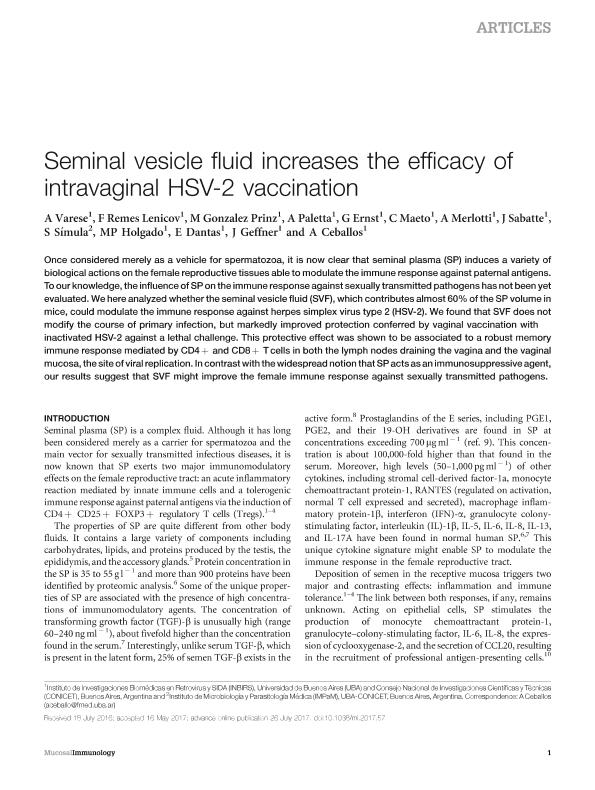Artículo
Seminal vesicle fluid increases the efficacy of intravaginal HSV-2 vaccination
Varese, Augusto ; Remes Lenicov, Federico
; Remes Lenicov, Federico ; Gonzalez Prinz, M; Paletta, A.; Ernst, G; Maeto, Cynthia Alejandra
; Gonzalez Prinz, M; Paletta, A.; Ernst, G; Maeto, Cynthia Alejandra ; Merlotti Ippólito, Antonela
; Merlotti Ippólito, Antonela ; Sabatte, Juan Atilio
; Sabatte, Juan Atilio ; Simula, Silvina
; Simula, Silvina ; Holgado, María Pía
; Holgado, María Pía ; Dantas, Ezequiel Carlos
; Dantas, Ezequiel Carlos ; Geffner, Jorge Raúl
; Geffner, Jorge Raúl ; Ceballos, Ana
; Ceballos, Ana
 ; Remes Lenicov, Federico
; Remes Lenicov, Federico ; Gonzalez Prinz, M; Paletta, A.; Ernst, G; Maeto, Cynthia Alejandra
; Gonzalez Prinz, M; Paletta, A.; Ernst, G; Maeto, Cynthia Alejandra ; Merlotti Ippólito, Antonela
; Merlotti Ippólito, Antonela ; Sabatte, Juan Atilio
; Sabatte, Juan Atilio ; Simula, Silvina
; Simula, Silvina ; Holgado, María Pía
; Holgado, María Pía ; Dantas, Ezequiel Carlos
; Dantas, Ezequiel Carlos ; Geffner, Jorge Raúl
; Geffner, Jorge Raúl ; Ceballos, Ana
; Ceballos, Ana
Fecha de publicación:
07/2017
Editorial:
Nature Publishing Group
Revista:
Mucosal Immunology
ISSN:
1933-0219
Idioma:
Inglés
Tipo de recurso:
Artículo publicado
Clasificación temática:
Resumen
Once considered merely as a vehicle for spermatozoa, it is now clear that seminal plasma (SP) induces a variety of biological actions on the female reproductive tissues able to modulate the immune response against paternal antigens. To our knowledge, the influence of SP on the immune response against sexually transmitted pathogens has not been yet evaluated. We here analyzed whether the seminal vesicle fluid (SVF), which contributes almost 60% of the SP volume in mice, could modulate the immune response against herpes simplex virus type 2 (HSV-2). We found that SVF does not modify the course of primary infection, but markedly improved protection conferred by vaginal vaccination with inactivated HSV-2 against a lethal challenge. This protective effect was shown to be associated to a robust memory immune response mediated by CD4+ and CD8+ T cells in both the lymph nodes draining the vagina and the vaginal mucosa, the site of viral replication. In contrast with the widespread notion that SP acts as an immunosuppressive agent, our results suggest that SVF might improve the female immune response against sexually transmitted pathogens.
Palabras clave:
Semen
,
Herpes
,
Vaccination
,
Sexually Transmitted Pathogens
Archivos asociados
Licencia
Identificadores
Colecciones
Articulos(INBIRS)
Articulos de INSTITUTO DE INVESTIGACIONES BIOMEDICAS EN RETROVIRUS Y SIDA
Articulos de INSTITUTO DE INVESTIGACIONES BIOMEDICAS EN RETROVIRUS Y SIDA
Citación
Varese, Augusto; Remes Lenicov, Federico; Gonzalez Prinz, M; Paletta, A.; Ernst, G; et al.; Seminal vesicle fluid increases the efficacy of intravaginal HSV-2 vaccination; Nature Publishing Group; Mucosal Immunology; 11; 2; 7-2017; 536-548
Compartir
Altmétricas



